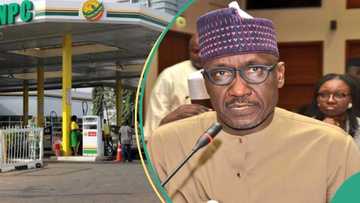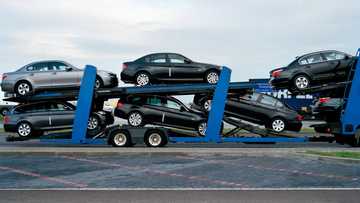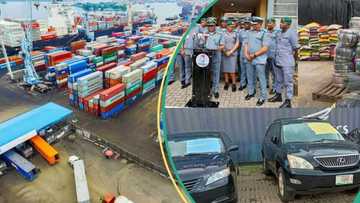Marketer Reveals Real Price of Petrol as FG Continues Fuel Subsidy in Secrecy, Spends N17.72bn Daily
- There are indications that the government is secretly spending N17.72 billion every day on fuel subsidies
- Petroleum industry stakeholders stated that the nation uses about 44.3 million litres of fuel each day
- They argue that although the price of crude oil has been relatively steady over the naira, it continued to weaken, affecting petrol price
Legit.ng journalist Zainab Iwayemi has over three years of experience covering the Economy, Technology, and Capital Market.
The Nigerian National Petroleum Company Limited (NNPC Ltd), through the federal government, appears to be spending N17.72 billion every day on fuel subsidies.

Source: UGC
In his inaugural speech on May 29, 2023, President Bola Ahmed Tinubu declared the end of fuel subsidies.
His statement caused the lowest limit of the petrol pump price to rise instantly, from N185 per litre to N480 and N560 per litre.
Two months later, the pump price increased to much beyond N600 per litre, with independent and large merchants selling at N627 per litre while NNPC retail in Abuja dispensed at N617. In certain places, the top limit was close to N680.
Since then, rates at independent stations and significant marketers have skyrocketed to N660–N680 per litre, while NNPC-owned stations and affiliates have continued to operate at the N617 per litre rate.
In several federation states, the highest limit has been raised to N750.
FG quietly sponsors fuel subsidy
Vanguard learned that the funding plan for subsidy, which is still shrouded in secrecy, is completed by NNPC, which directly recovers costs by selling crude oil.
The N17.7 billion subsidy cost, according to a senior executive of a significant petroleum marketing company in Lagos, is the difference between the landing cost of imported petroleum products and the actual wholesale price to petroleum marketers.

Read also
Nigerians groan over fuel scarcity at NNPC retail outlets as marketers open up on new petrol price
Nigeria imports all of the fuel it uses; according to Farouk Ahmed, CEO of the Nigerian Midstream and Downstream Petroleum Regulatory Authority (NMDPRA), the nation uses about 44.3 million litres of fuel each day.
The FG through NNPC may be experiencing monthly losses or a revenue shortfall of almost N531 billion at the current average fuel price and currency rate.
The Federation Account Allocation Committee (FAAC) has begun to include this in its monthly reports.
The ultimate distributable balance is much larger than the pre-May 30, 2023 statistics because of increased product prices, even after the NNPC deducts this shortfall from its remittances to the Federation Account.
The decline in the value of the Naira relative to the US dollar, according to Chief Chinedu Ukadike, the immediate past public relations officer of the Independent Petroleum Marketers Association of Nigeria, or IPMAN, is a significant factor in the rise in gas prices.

Read also
Prices of imported vehicles change as Customs adjusts exchange rates; imports rise by 226.4 per cent
While crude oil prices have been relatively steady over the past year, Ukadike noted that the naira has continued to weaken in relation to the US dollar since President Tinubu decided to float the currency.
He clarified that it is hard for anyone to argue that there hasn't been a significant rise in the price of gasoline between last year, when the subsidy was abolished, and now, when the exchange rate is N1,600/dollar.
He explained:
“Because NNPC is the sole importer of PMS in this country, it is tough for anyone to say the actual cost of importing PMS into the country. Simple mathematics will tell you that the price cannot be the same when a dollar was exchanged for N750 and now that it is N1,600 to a dollar. What this means is that the price is above N1,000 per litre.
“So, the foreign exchange determines the price at the local market, and if the forex rate has increased, invariably, the landing price of petroleum products has also increased by the same magnitude. I don’t know the magic through which they continue to sustain the price of PMS at the same level.”
He said that although the ex-depot price is now shown on the NNPC portal at N566.7 per litre, independent marketers are unable to load at NNPC depots and are instead forced to rely on private depots that NNPC supplies for N630 per litre.
Petrol landing cost hits new record
Legit. ng reported that as Nigeria's foreign exchange crisis worsened, the landing cost of imported petrol exceeded N1,000 per litre.
Findings by BusinessDay indicated that the landing cost of gasoline—which includes the product's foreign pricing, transportation, insurance, and other charges—rose to N1,009/litre in October 2023 from N720/litre at the black-market rate of N1,500 per dollar.
According to data from the FMDQ, the naira lost 4.19% of its value after trading on Monday, February 12.
PAY ATTENTION: Unlock the best of Legit.ng on Pinterest! Subscribe now and get your daily inspiration!
Source: Legit.ng




